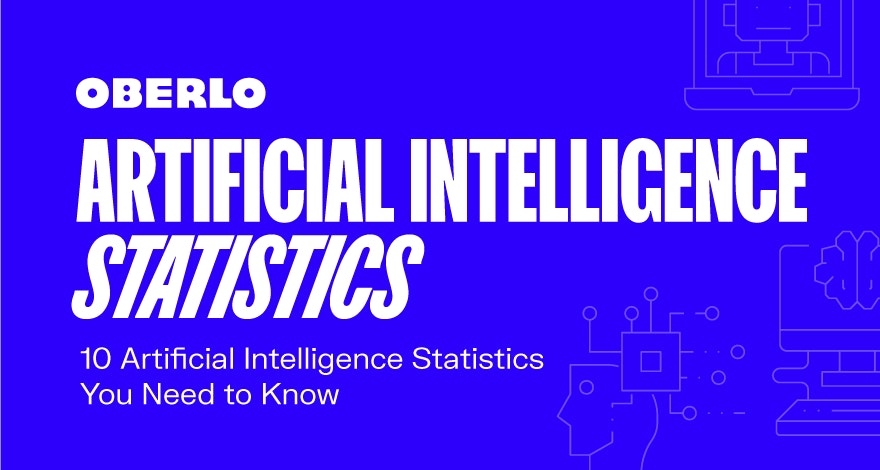Artificial Intelligence (AI) is one of the fastest-growing and most popular data-driven technologies being used all around the world.
From governments and large organizations to small online businesses, artificial intelligence is being used by multiple entities across the world.
What’s the role of AI in businesses? What do consumers think about the technology? And how can you use it to power sales?
In this article, we’ll dive into the ten most important artificial intelligence statistics you need to know in 2023 and cover everything from the use of AI in businesses to the advantages it brings.
Ready? Let’s get to it.
Post Contents
- 1. Growing Use of Artificial Intelligence
- 2. Artificial Intelligence Growth
- 3. AI in Business
- 4. AI in Business Productivity
- 5. Customers Willing to Use AI to Improve Their Experiences
- 6. The Power of AI in Customer Service
- 7. Artificial Intelligence Statistics in Sales
- 8. Cost Benefits of Adopting AI in Businesses
- 9. AI-Powered Voice Assistance Usage Growth
- 10. Trust Is Critical for AI Deployment
- Conclusion
- Summary: Artificial Intelligence Statistics
- Want to Learn More?



1. Growing Use of Artificial Intelligence
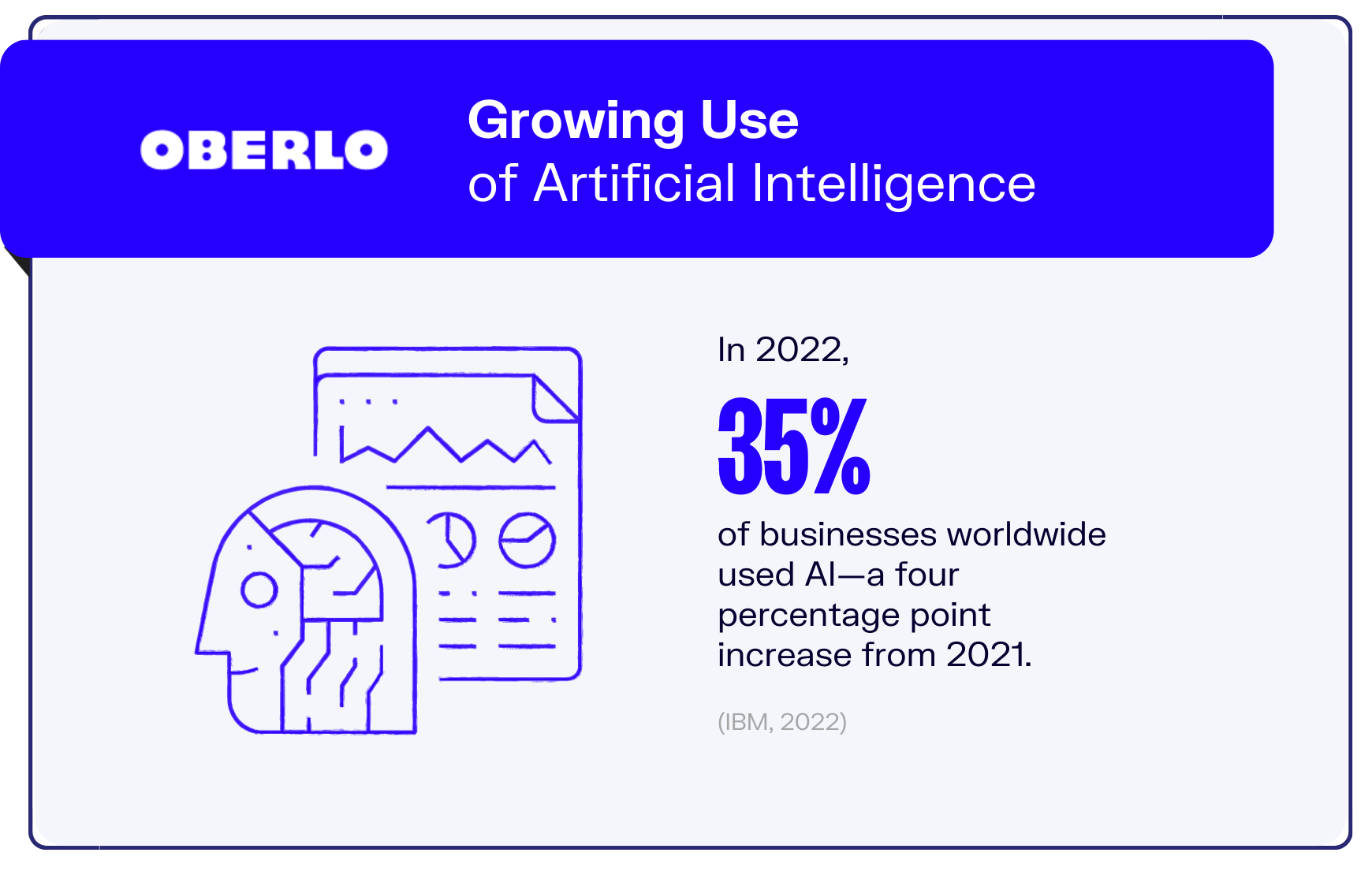
Although the use of AI is yet to be the norm in organizations, statistics show that an increasing number of enterprises are starting to employ it within their business operations.
→ Click Here to Launch Your Online Business with Shopify
In 2022, more than one in three, or 35%, to be exact, of organizations reported that they were using artificial intelligence technology in one way or another in their businesses (IBM, 2022). This was four percentage points higher than in 2021.
That’s not all. 42% said they were looking into AI and its benefits and are considering incorporating them into their business processes. This should come as no surprise, since (as we’ll further explore in another AI statistic) more than half of organizations already using AI have reported benefiting from it.
In fact, it’s clear that organizations are starting to pay more and more attention to the power of artificial intelligence. It’s been named the most disruptive technology by chief intelligence officers and IT leaders worldwide, surpassing data and analytics.
2. Artificial Intelligence Growth
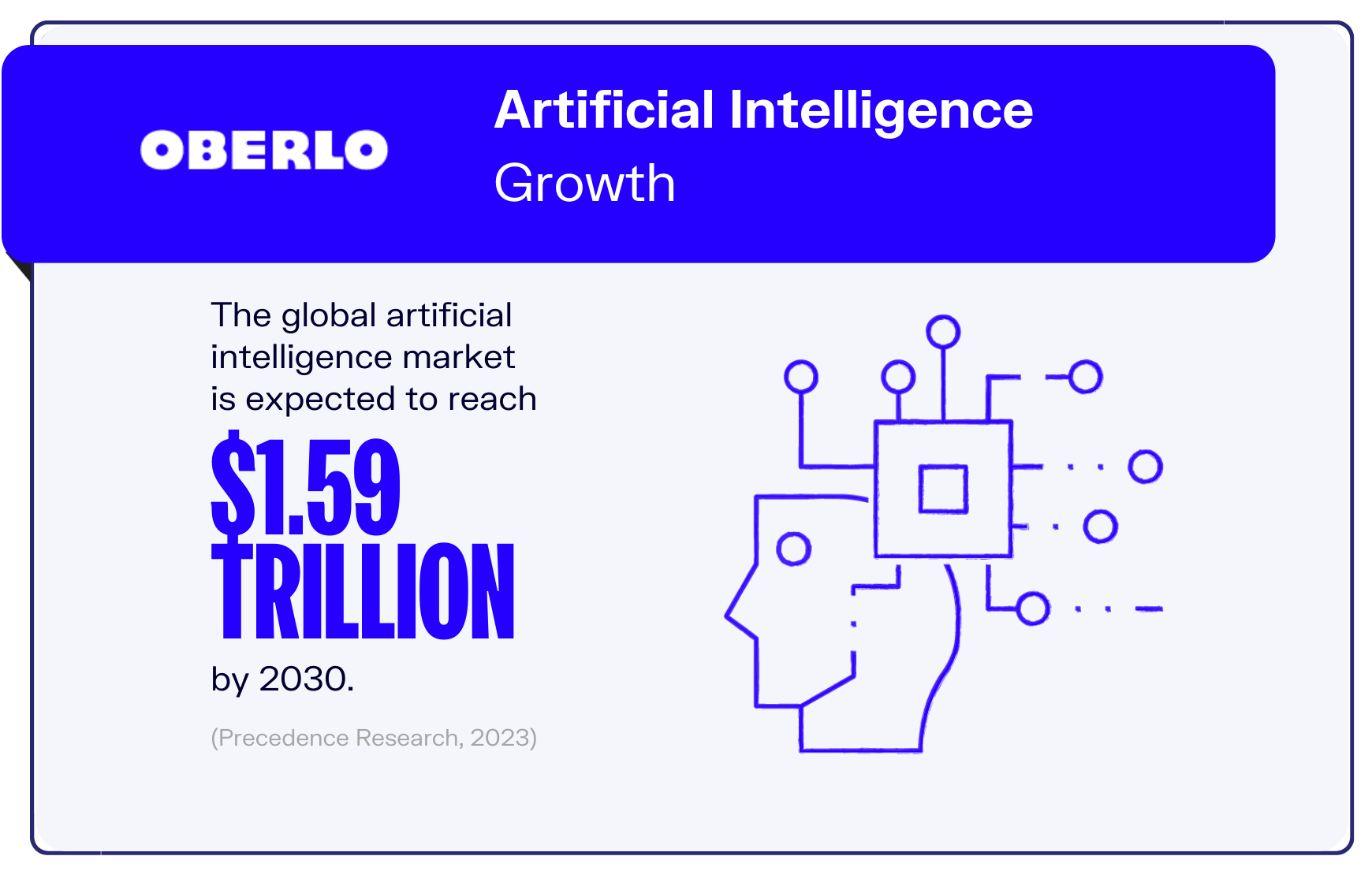
With the growing implementation of artificial intelligence among organizations, it should come as no surprise that the market size of AI is set to increase dramatically.
The latest data shows that the market size of artificial intelligence was valued at $87.04 billion in 2021 (Precedence Research, 2023). This figure is projected to nearly double to $164.99 billion in 2023. By 2030, the global AI market is set to be worth over $1.5 trillion, marking an impressive Compound Annual Growth Rate (CAGR) of 38.1 percent from 2022 to 2030.
Analysts say that rising internet penetration and digital tech have been the main driving forces behind this impressive artificial intelligence growth. Looking ahead, growing demand for the technology is set to continue driving AI’s growth. Much of this demand is likely to come from the automotive, healthcare, banking and finance, manufacturing, retail, logistics, and food and beverage sectors.
3. AI in Business
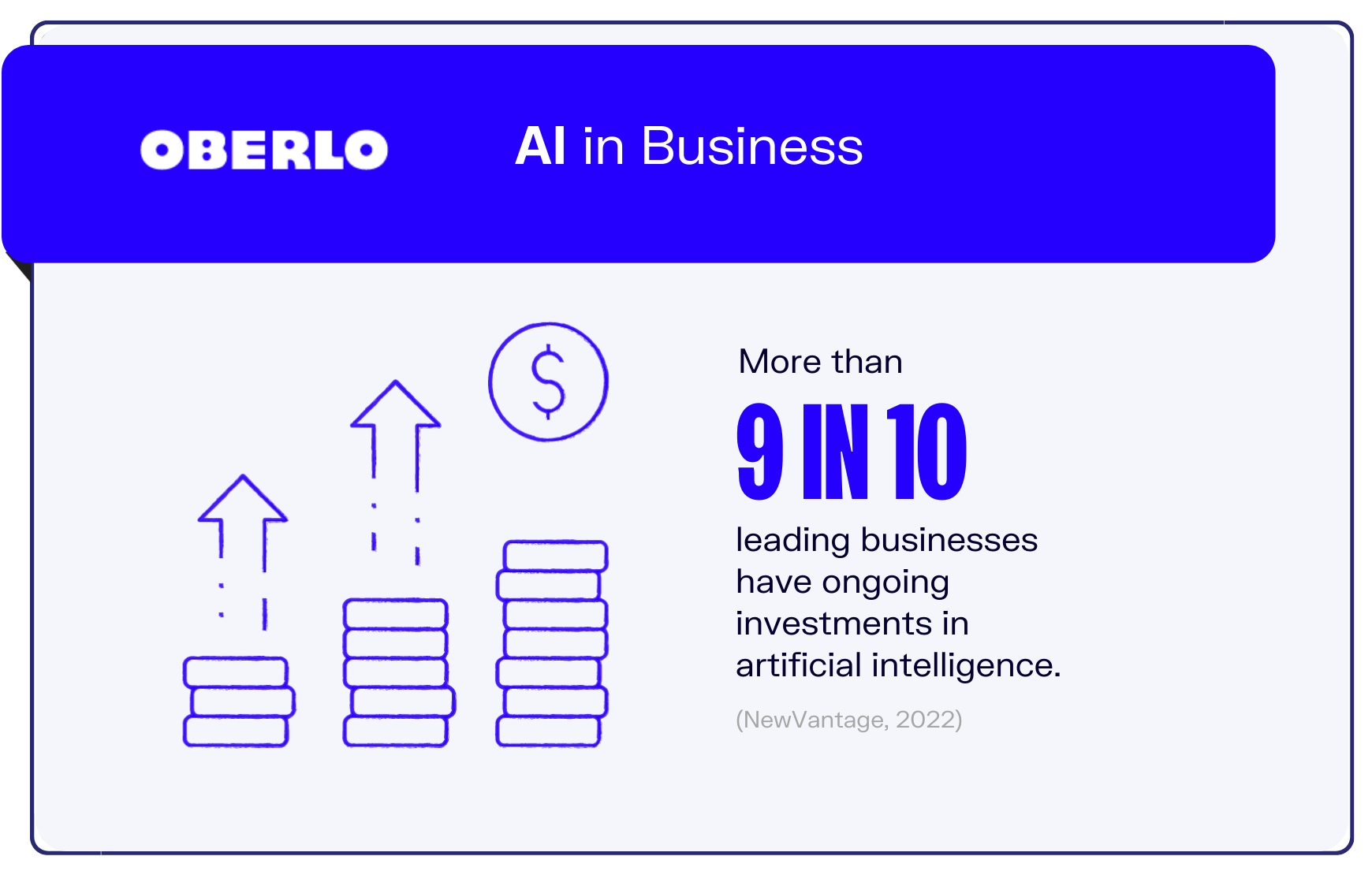
The above two artificial intelligence statistics are proof of its widespread adoption by businesses. But as we’ll see, the growing use of artificial intelligence is even more prevalent among leading companies around the globe and in particular the healthcare and life sciences sectors.
Artificial intelligence statistics from a recent survey show that more than nine in ten (91 percent) top businesses surveyed report having an ongoing investment in AI (NewVantage, 2022).
Most of the companies surveyed belong to the financial services sector, but participants also include other leading firms like Facebook and McDonalds and healthcare companies like Pfizer and CVS Health.
Not only are many businesses investing in artificial intelligence, but the survey results also show that nearly all of them (91.7 percent) are also increasing their investment.
That being said, not all of these businesses are in the advanced stages of being data-driven. In fact, only 39.7 percent of them say they’re using data as an asset, and just one in five (19.3 percent) claim to have a data culture within the company.
4. AI in Business Productivity
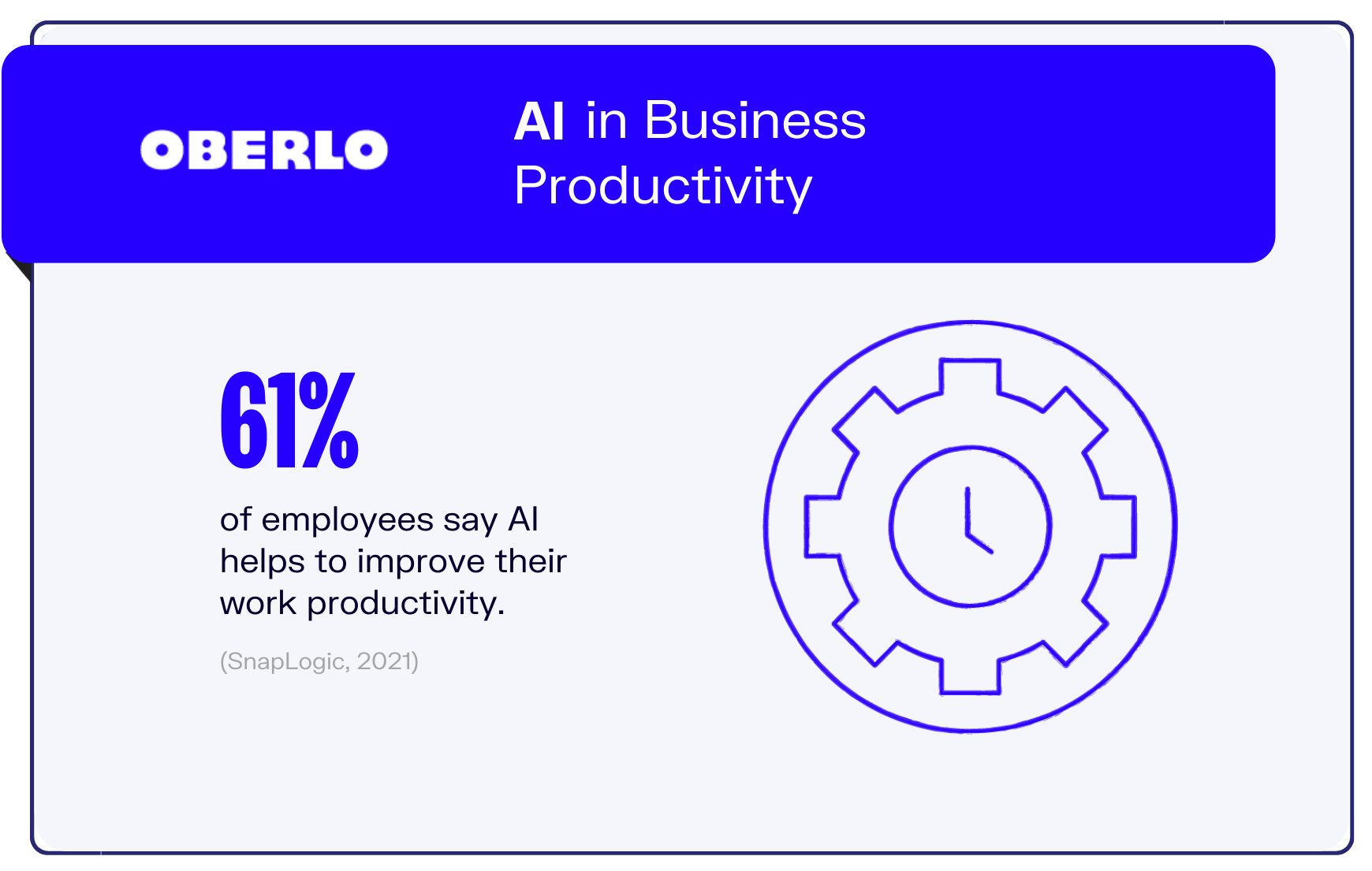
The growing use of artificial intelligence by companies shows that there are plenty of benefits to be reaped.
One such benefit is improved productivity as tedious, repetitive, and routine tasks can be offloaded to AI, allowing employees to spend more time on analysis.
Statistics show that 61 percent of workers say that their adoption of AI within the workplace has led to a boost in productivity (SnapLogic, 2021).
As the saying goes, two heads are better than one. Such effective use of AI also helps with improved collaboration in the workplace. More than one-third of employees say AI has resulted in better cooperation between teams.
In fact, employees are so pleased with how AI has assisted them in their work that more than two-thirds (68 percent) of them want more AI-based technology to be introduced in the workplace.
5. Customers Willing to Use AI to Improve Their Experiences
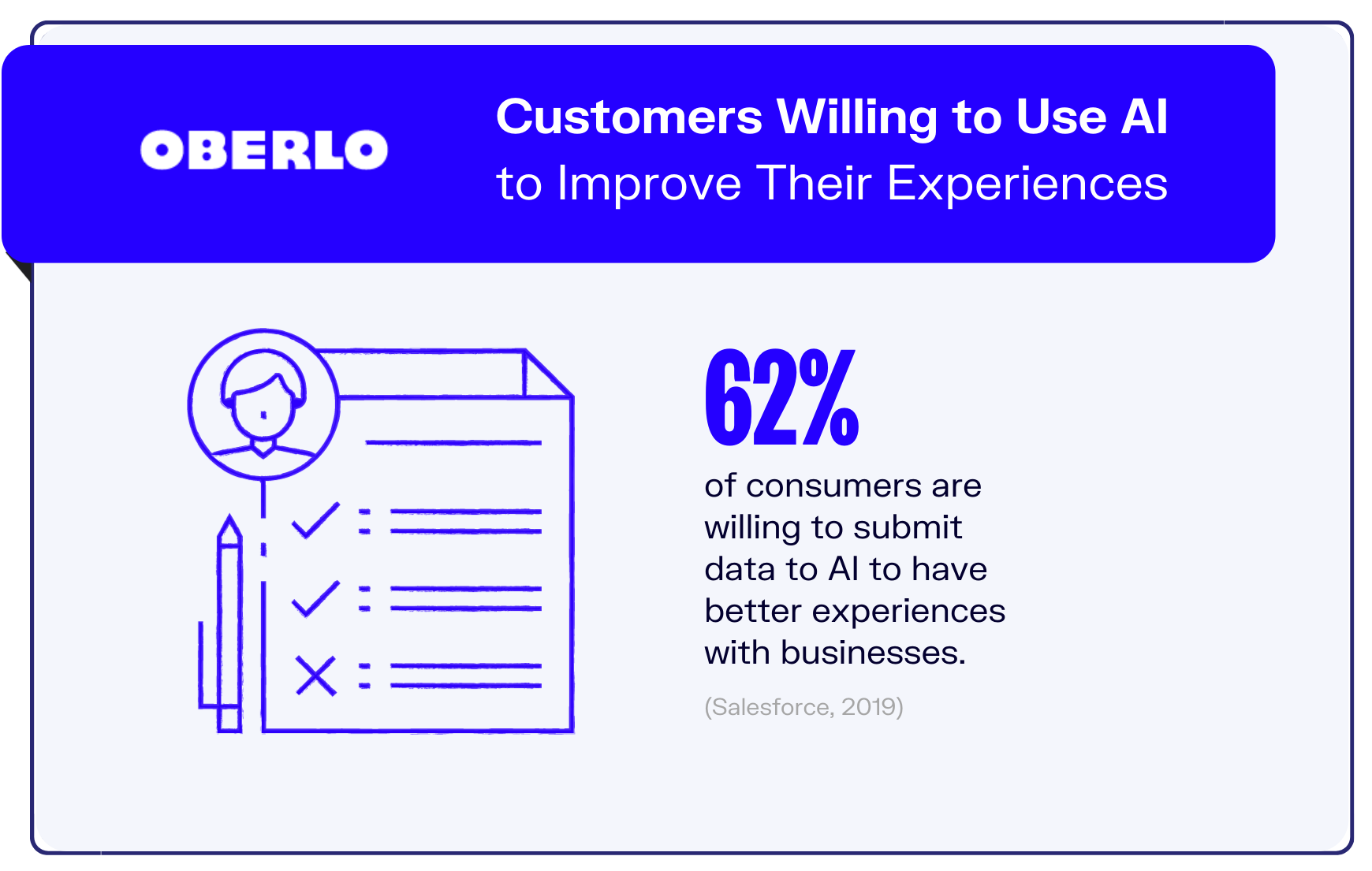
The growing use of artificial intelligence isn’t just widespread in businesses. As the technology goes mainstream, consumers worldwide have become more receptive and accepting of it.
The latest artificial intelligence statistics show that in 2019, 62 percent of consumers said they were willing to use AI to improve their experience (Salesforce, 2019). That was an uptick from 59 percent in 2018.
Businesses, however, will need to work on communicating how they’re using AI within their organizations. Despite the growing acceptance of AI, many consumers remain wary of how businesses are using the technology.
Just over half (54 percent) of them say they trust companies to use the data collected from AI in a way that’s beneficial to consumers, while only over one-third (39 percent) say companies are transparent enough about the way they’re using AI.
6. The Power of AI in Customer Service
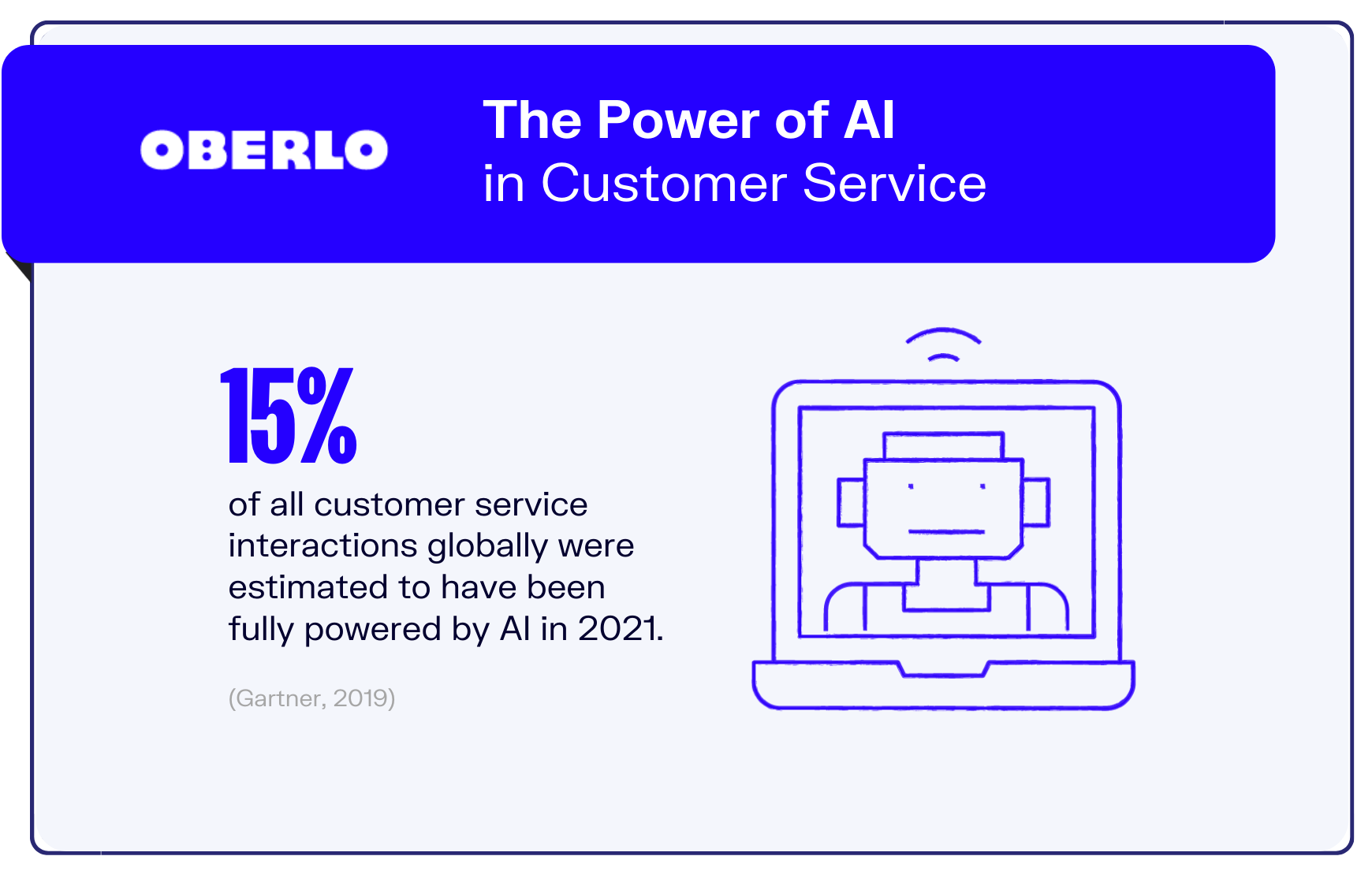
As the above artificial intelligence statistics have shown, AI is permeating all walks of business, and customer service is no exception.
The latest statistics show that in 2021, as many as 15 percent of customer service interactions worldwide were fully powered by AI (Gartner, 2019). That’s a whopping 400 percent increase from as recently as 2017.
Areas within customer service in which AI is currently being used include bots and virtual customer assistants. In fact, nearly one in four (23 percent) of customer service organizations currently use AI-powered chatbots.
These allow for a larger capacity to handle queries, a more efficient interaction due to quicker chat speeds in real time, and more control over the data collected from consumers.
Such benefits are becoming crucial for companies as consumers’ demands for better customer service experiences grow. For instance, 71 percent of consumers expect to be able to communicate with businesses in real time.
7. Artificial Intelligence Statistics in Sales
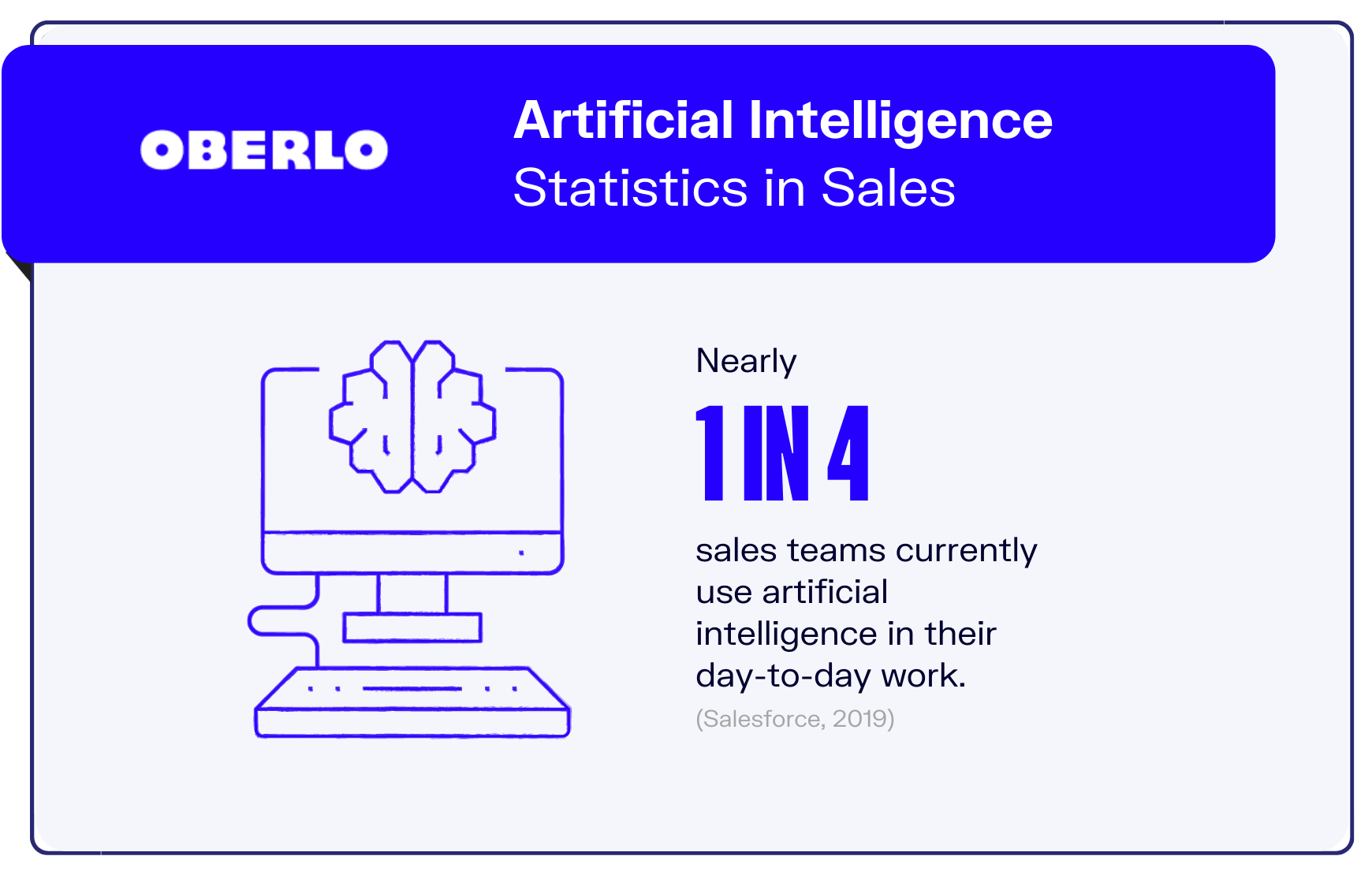
Customer service aside, sales departments across many organizations have also implemented artificial intelligence in their day-to-day work.
In 2018, 21 percent of sales teams were using artificial intelligence (Salesforce, 2019). This figure is set to soar by 155 percent in two years. By 2020, 54 percent of them were expected to be using the technology.
The rapid adoption of AI is the fastest of any other technology used by sales teams. In comparison, the use of marketing automation is forecast to increase by 104 percent, and the adoption of a partner relationship management system by 95 percent.
These are likely to be implemented within processes such as automation and quote configuration tools. These will help salespeople to better understand the needs of their consumers. With tedious tasks out of the way, they can work on being better advisors to them.
Going forward, the majority of sales teams are forecasting that AI capabilities will improve over the next five years to provide more enhanced data. Seven out of ten high-performing salesmen expect better intelligence forecasting, while 66 percent expect improved opportunity insights and better lead prioritization.
8. Cost Benefits of Adopting AI in Businesses
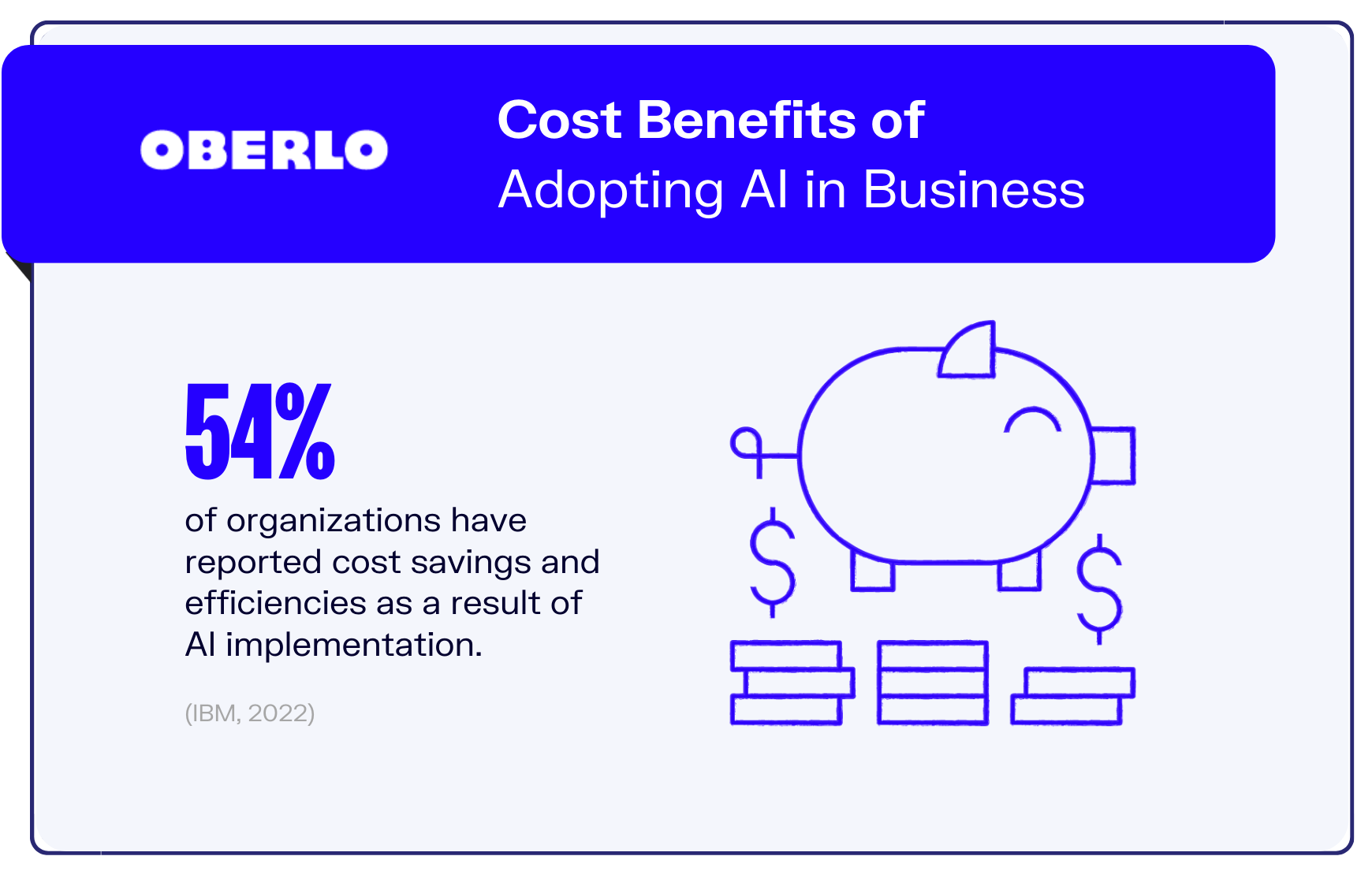
From the above artificial intelligence statistics, it’s clear that AI plays a vital role in businesses. But improvements to customer service and sales aside, there’s also a financial incentive for companies to adopt AI.
According to the latest artificial intelligence facts and statistics, 54 percent of firms using AI reported seeing cost savings and efficiencies (IBM, 2022). This makes it the largest benefit of AI use in businesses. In fact, two in five (42 percent) businesses that are either already using AI or are looking to do so say the need to reduce costs is a reason they’re exploring AI adoption.
Monetary incentives aside, AI also contributes to improvements in IT or network performance—53 percent of businesses list it as a benefit of using the technology. Other AI advantages include better customer experiences, employees having more time to focus on higher-value tasks, and the ability to scale and deliver new services more rapidly.
9. AI-Powered Voice Assistance Usage Growth
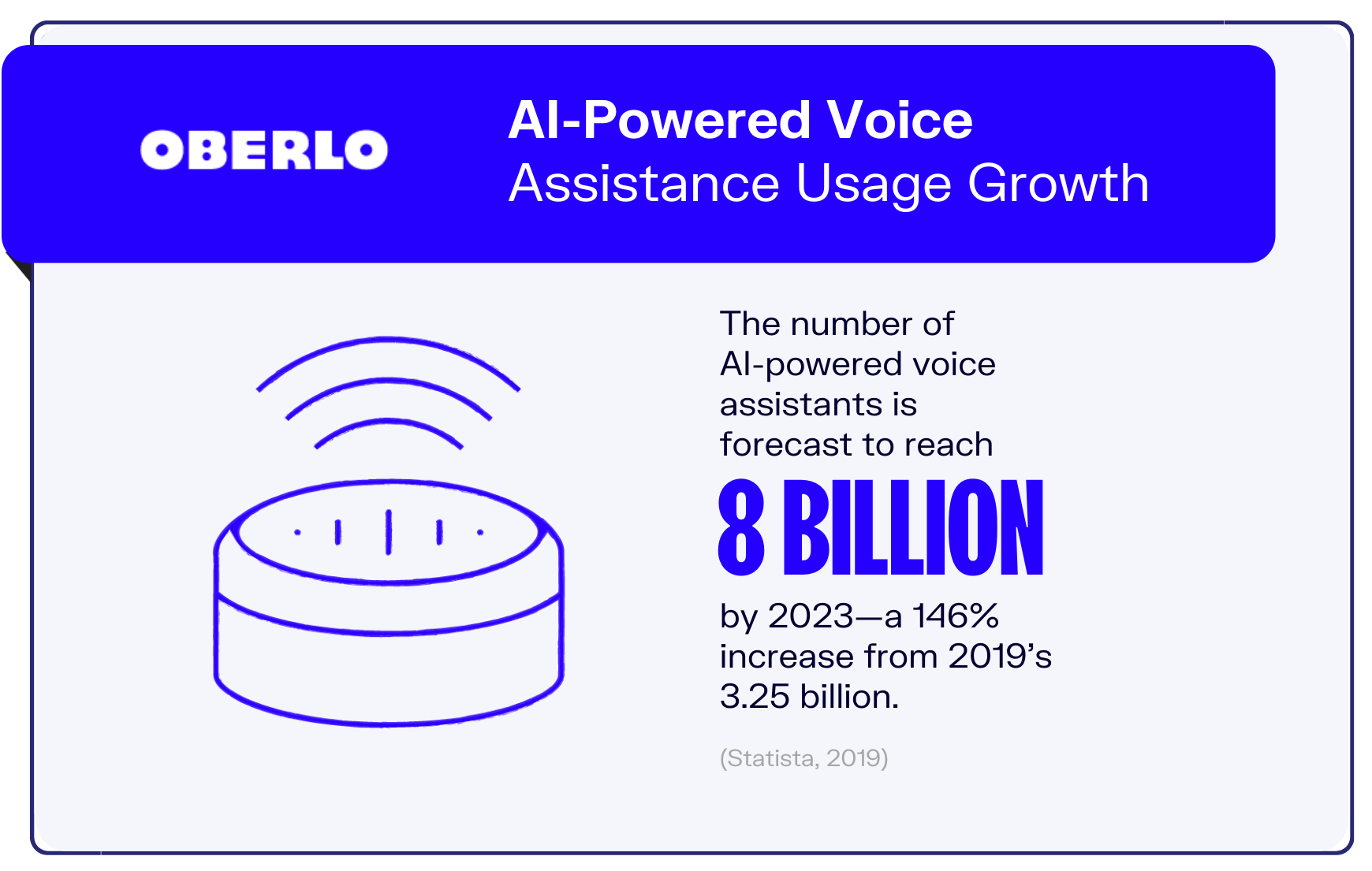
One of the most popular uses of artificial intelligence has come in the use of voice-assisted devices and data shows that this trend will only grow in the coming years.
In fact, the number of AI-powered voice assistants is expected to reach 8 billion by 2023 (Statista, 2019). This is more than the global population, an indication that users of voice assistants are likely to own more than one such device.
It also marks an increase of 4.75 billion from the 3.25 billion digital voice assistants worldwide in 2019, and a whopping 146 percent increase in just four years.
It’s estimated that in the United States alone, there are over 110 million users of virtual assistants, with devices like smartphones and smart speakers proving to be particularly popular.
One common usage of these AI-powered voice assistants is for online shopping. As it stands, 43 percent of owners of voice-assisted devices aged between 45 and 60 in the US currently use them to purchase items online.
10. Trust Is Critical for AI Deployment
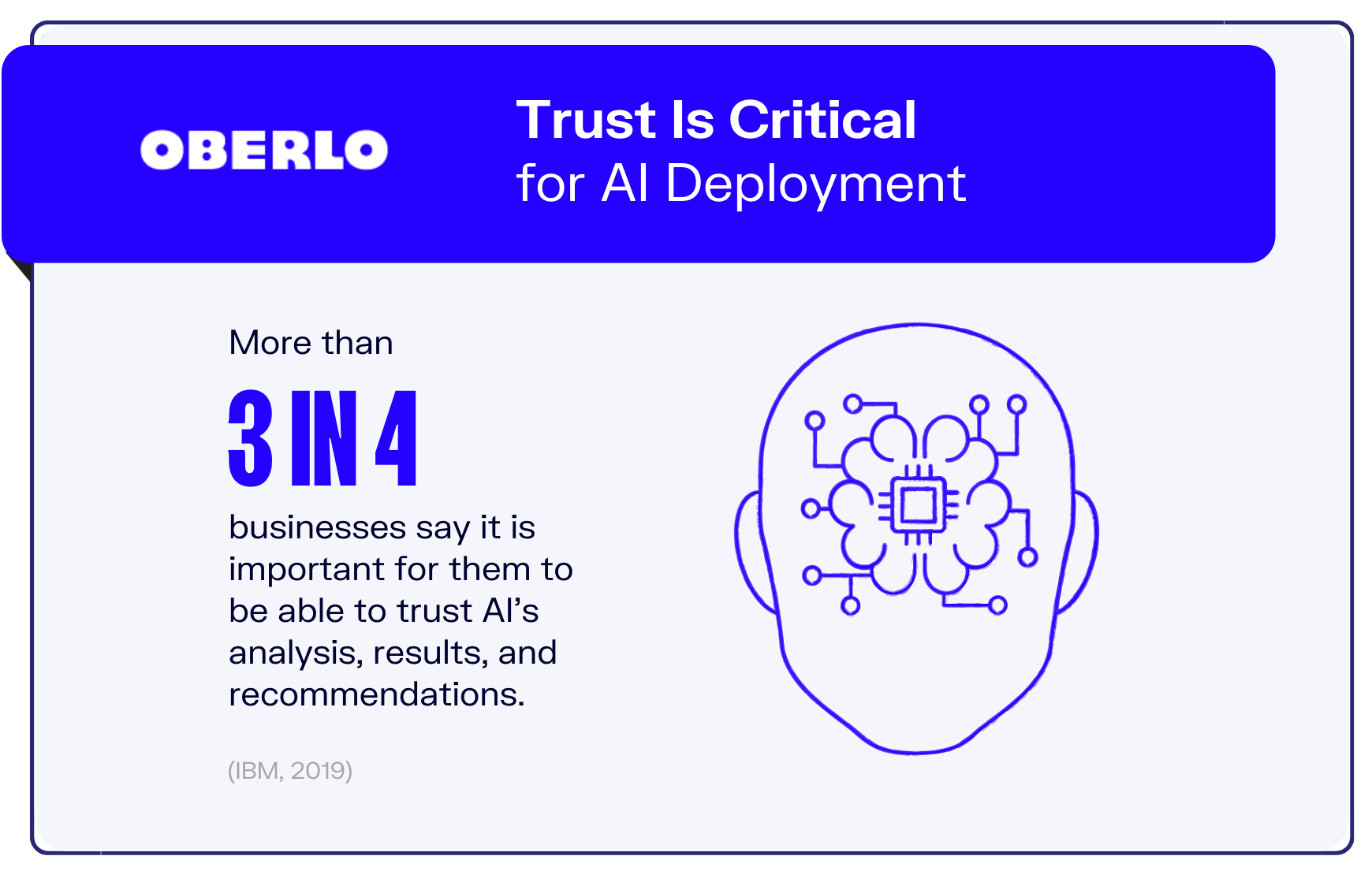
Not only is trust important for consumers whose data is being collected and analyzed by artificial intelligence, but organizations also say they must be able to trust the technology’s recommendations.
More than three out of four (78 percent) companies say that it is important that results obtained from AI are “fair, safe, and reliable” (IBM, 2019). Even more of them (83 percent) place emphasis on understanding its algorithm—that is, they want to understand how the technology arrived at its conclusion and be able to explain it.
This comes as no surprise, considering that the data from AI affects decision-making. For businesses, this may affect sales and marketing strategies, human resources and hiring, and even more critical strategies like company growth and expansion.
To ensure AI data is reliable, companies should consider implementing a system that includes checks of impartiality, transparency, responsibility, and accountability, having the right security measures in place, constant tracking of reliability, and the protection of customer data.
Conclusion
We hope that these ten artificial intelligence facts were able to help you understand the direction in which businesses are heading when it comes to the latest data-driven technology.
Though the benefits of AI in businesses are undeniable, there are many issues to consider when implementing them.
Be it for sales, marketing, or customer service, you may now go forth and put these artificial intelligence statistics to good use when building your ecommerce store.

Summary: Artificial Intelligence Statistics
Here’s a summary of the Artificial Intelligence statistics you need to know in 2023:
- In 2022, 35% of businesses worldwide used AI—a four percentage point increase from 2021.
- The global artificial intelligence market is expected to reach $1.59 trillion by 2030.
- 91 percent of leading businesses have ongoing investments in artificial intelligence.
- 61 percent of employees say AI helps to improve their work productivity.
- 62 percent of consumers are willing to submit data to AI to have better experiences with businesses.
- 15 percent of all customer service interactions globally were expected to have been fully powered by AI in 2021.
- Nearly one in four sales teams currently use artificial intelligence in their day-to-day work.
- 54 percent of organizations have reported cost savings and efficiencies as a result of AI implementation.
- The number of AI-powered voice assistants is forecast to reach 8 billion by 2023—a 146 percent increase from 2019’s 3.25 billion.
- More than three in four businesses say it is important for them to be able to trust AI’s analysis, results, and recommendations.



Want to Learn More?
- WooCommerce vs. Shopify: Which Is the Better?
- 11 Best Free PDF Editor Tools
- Instagram Stories: The Ultimate Beginners Guide
- 10 Virtual Reality Statistics You Need to Know [Infographic]
Is there anything else you’d like to know about artificial intelligence statistics and wish was included in this article? Let us know in the comments below!
